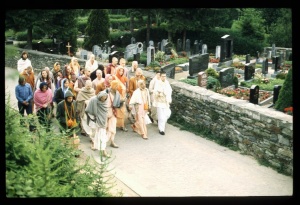CC Antya 17.50: Difference between revisions
m (1 revision(s)) |
No edit summary |
||
| Line 1: | Line 1: | ||
{{ | [[Category:Sri Caitanya-caritamrta - Antya-lila Chapter 17|C050]] | ||
<div style="float:left">'''[[Sri Caitanya-caritamrta|Śrī Caitanya-caritāmṛta]] - [[CC Antya|Antya-līlā]] - [[CC Antya 17|Chapter 17: The Bodily Transformations of Lord Śrī Caitanya Mahāprabhu]]'''</div> | |||
<div style="float:right">[[File:Go-previous.png|link=CC Antya 17.49|Antya-līlā 17.49]] '''[[CC Antya 17.49|Antya-līlā 17.49]] - [[CC Antya 17.51|Antya-līlā 17.51]]''' [[File:Go-next.png|link=CC Antya 17.51|Antya-līlā 17.51]]</div> | |||
{{CompareVersions|CC|Antya 17.50|CC 1975|CC 1996}} | |||
{{RandomImage}} | |||
==== TEXT 50 ==== | ==== TEXT 50 ==== | ||
<div | <div class="verse"> | ||
bhāva-śābalye rādhāra ukti, līlā-śuke haila sphūrti, | :bhāva-śābalye rādhāra ukti, līlā-śuke haila sphūrti, | ||
sei bhāve paḍe eka śloka | :sei bhāve paḍe eka śloka | ||
unmādera sāmarthye, sei ślokera kare arthe, | :unmādera sāmarthye, sei ślokera kare arthe, | ||
yei artha nāhi jāne loka | :yei artha nāhi jāne loka | ||
</div> | </div> | ||
| Line 14: | Line 18: | ||
==== SYNONYMS ==== | ==== SYNONYMS ==== | ||
<div | <div class="synonyms"> | ||
bhāva- | ''bhāva-śābalye''—in the aggregate of all ecstasies; ''rādhāra''—of Śrīmatī Rādhārāṇī; ''ukti''—statement; ''līlā-śuke''—in Bilvamaṅgala Ṭhākura; ''haila''—there was; ''sphūrti''—awakening; ''sei bhāve''—in that ecstasy; ''paḍe''—recites; ''eka''—one; ''śloka''—verse; ''unmādera''—of madness; ''sāmarthye''—in the capacity; ''sei ślokera''—of that verse; ''kare arthe''—describes the meaning; ''yei artha''—which meaning; ''nāhi''—do not; ''jāne''—know; ''loka''—people. | ||
</div> | </div> | ||
| Line 21: | Line 25: | ||
==== TRANSLATION ==== | ==== TRANSLATION ==== | ||
<div | <div class="translation"> | ||
The aggregate of all these ecstasies once awoke a statement by Śrīmatī Rādhārāṇī in the mind of Bilvamaṅgala Ṭhākura [Līlā-śuka]. In the same ecstatic mood, Śrī Caitanya Mahāprabhu now recited that verse, and on the strength of madness He described its meaning, which is unknown to people in general. | The aggregate of all these ecstasies once awoke a statement by Śrīmatī Rādhārāṇī in the mind of Bilvamaṅgala Ṭhākura [Līlā-śuka]. In the same ecstatic mood, Śrī Caitanya Mahāprabhu now recited that verse, and on the strength of madness He described its meaning, which is unknown to people in general. | ||
</div> | </div> | ||
__NOTOC__ | |||
<div style="float:right; clear:both;">[[File:Go-previous.png|link=CC Antya 17.49|Antya-līlā 17.49]] '''[[CC Antya 17.49|Antya-līlā 17.49]] - [[CC Antya 17.51|Antya-līlā 17.51]]''' [[File:Go-next.png|link=CC Antya 17.51|Antya-līlā 17.51]]</div> | |||
__NOTOC__ | |||
__NOEDITSECTION__ | |||
Revision as of 12:17, 24 September 2021

A.C. Bhaktivedanta Swami Prabhupada
TEXT 50
- bhāva-śābalye rādhāra ukti, līlā-śuke haila sphūrti,
- sei bhāve paḍe eka śloka
- unmādera sāmarthye, sei ślokera kare arthe,
- yei artha nāhi jāne loka
SYNONYMS
bhāva-śābalye—in the aggregate of all ecstasies; rādhāra—of Śrīmatī Rādhārāṇī; ukti—statement; līlā-śuke—in Bilvamaṅgala Ṭhākura; haila—there was; sphūrti—awakening; sei bhāve—in that ecstasy; paḍe—recites; eka—one; śloka—verse; unmādera—of madness; sāmarthye—in the capacity; sei ślokera—of that verse; kare arthe—describes the meaning; yei artha—which meaning; nāhi—do not; jāne—know; loka—people.
TRANSLATION
The aggregate of all these ecstasies once awoke a statement by Śrīmatī Rādhārāṇī in the mind of Bilvamaṅgala Ṭhākura [Līlā-śuka]. In the same ecstatic mood, Śrī Caitanya Mahāprabhu now recited that verse, and on the strength of madness He described its meaning, which is unknown to people in general.